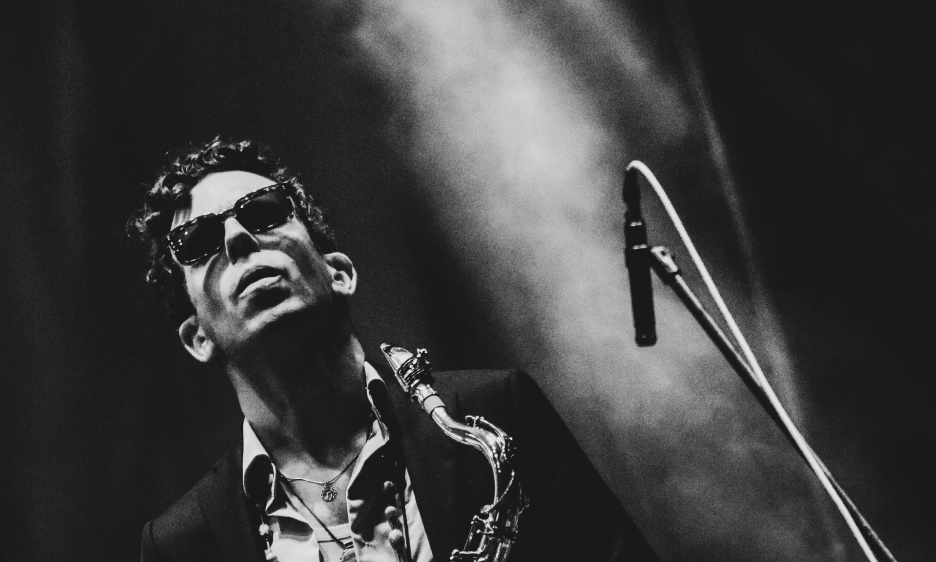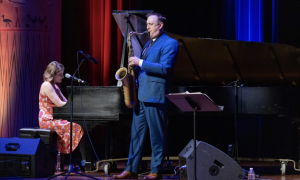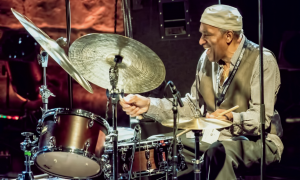Home » Jazz Articles » Catching Up With » Oded Tzur: The Agony And The Ecstasy
Oded Tzur: The Agony And The Ecstasy

Courtesy Silvia Bobariu
The only way to survive the process of recording was to say, OK, even if I've lost all faith in humanity, there is at least one person who I believe in and one person that I love and trust, so let me just focus on that one person and tell the story of her life.
—Oded Tzur
In his message, Tzur also addressed the metaphysical aspects of what is perhaps the deepest album he has yet recorded: "This album celebrates music as the epicenter of a spiritual discipline: a prophet that tells us not about the future, but about who we really are. The goddess of music personified in the album is inspired by my wife, who is also the subject of my previous album Isabela [ECM, 2022]. Thematically a prequel, My Prophet examines the process by which a person becomes who they are, as well as the powers that help us discover our true nature."
In this interview, Tzur talks about his understanding of prophets and prophecy and how it is reflected in My Prophet. It is rare, in our materialistic times, for a musician to engage with such arcane metaphysical concerns. But Tzur is an exceptional artist. Listening to his work, like listening to late period

John Coltrane
saxophone1926 - 1967

Charles Lloyd
saxophoneb.1938
The Goddess Of Music
Tzur met his Brazilian-born wife, Isabela, in May 2014, in New York. Their first date was in Central Park. During the interview, Tzur said, "We will be celebrating our tenth anniversary in nine days." The temporal and metaphysical stories related by him on My Prophet and Isabela combine to form a linear narrative—but one without words, so its details, and even its broad brushstrokes, are not spelled out for listeners. Isabela's spiritual journey from childhood to womanhood and on to her position as muse and font of wisdom for Tzur may, however, be imagined by an empathetic listener.But, ultimately, knowing the facts and events behind the story told on the two albums is unimportant. What is important is that in the telling, Tzur was inspired to new levels of reverence and eloquence. The attentive listener is carried along in their wake. Preceded as it may have been by four extraordinary albums, My Prophet is Tzur's most perfect release to date.
As an artist, Tzur has come a long way, literally and metaphorically, since his teenage years in Israel learning the saxophone. Back then, he wanted nothing more than to sound like

Dexter Gordon
saxophone, tenor1923 - 1990
In a 2022 interview with AAJ, Tzur explained the genesis of Isabela thus: "I decided to create this portrait [of my wife] right after doing Here Be Dragons actually. I was fascinated by the prospect of trying to describe her in music and I have to say it was the most challenging thing I have ever done in music, because instrumental music is abstract. If you wanted to paint a picture of someone and you want it to be abstract that's your choice, because you can also make it a more literal presentation. But in instrumental music you don't really have a literal option. How could you possibly do justice to the most beautiful person in the world in melodies that you sit and write?" (The full interview can be read here.)
What led Tzur to take on a prequel?
"I was actually quite depressed after Isabela came out," he says. "I didn't want to write about anything else and now I'd done it. I didn't know what else I could write about that would excite me as much or would feel as meaningful. So, eventually, I began to write a prequel. It starts with Isabela's childhood, a person arriving into the world, and the miracle of this person now existing, and then growing and becoming the person that she is. That's what the album is all about. How we become ourselves."
When writing or talking about Isabela, Tzur sometimes does so on an everyday level, and at other times on a mystical level as an "all powerful deity" and the "goddess of music." Would he unpack this please?
"Yes. Absolutely. Your question is on point," he says. "What happened was that, chronologically speaking, I started by writing the story of my wife as I just explained. About how she became who she is and how did she even exist in the first place. About how do any of us become ourselves. When we grow up and find who we are, do we find something that was always there or do we become ourselves as we go along? So maybe a little of a nurture versus nature type of question.
"As I was faced with this question while writing this album, asking again and again how does a person become themselves, I was also thinking about the nature of prophecy itself. Whether prophecy is about the future, where prophets tell us about something that is about to happen or will happen later—or whether prophets actually tell us something about who we are inside, something that we know but might have forgotten. I remember taking classes in elementary school about the Bible and reading about the Jewish prophets and noticing that indeed most of the time what a prophet does in that context is come to the community and say, 'You have forgotten your ways, you know what the truth is but you have forgotten about it.' So the job of the prophet is to return us home, not to foretell the future.
"If we think of it in this way, then music can be thought of as the ultimate prophet. Because what other than music has that power to bring us home in this way? For me there's nothing like music. And that's when the album became something bigger than only the story of this one person, and rather about the nature of prophecy and the whole point of returning versus thinking there's maybe something out there happening later that will reveal something to me that I don't already know. That's what I mean about that all powerful deity that is the goddess of music."
Music As Collective Meditation
Tzur's explanation is linked to another of his core beliefs, that music is the most effective form of collective meditation available to us. "It's the type of meditation that I've always identified as important," he says. "And maybe the times that we live in now make it all the more important, to know the power that music has."Which kind of brings us back to where this article began, and how October 7, 2023 almost knocked My Prophet off course. Were the issues Tzur wrote about to his mailing list subscribers simply logistical, or were they deeper than that?
"Mostly it just seemed very strange to be recording at that time, and because of that I considered cancelling it," says Tzur. "But it became a reminder of its own theme, because the only way to survive the process of recording it was to say, 'OK, even if I've lost all faith in humanity, there is at least one person who I believe in and one person that I love and trust, so let me just focus on that one person and tell the story of her life.'"
Listening to My Prophet, there are times when it sounds as though the anguish created by October 7 and its aftermath led Tzur to previously uncharted degrees of ardor in his playing. Tzur agrees that he and the band play with unprecedented passion, but he ascribes the cause of that elsewhere.
"I don't know if I necessarily felt anguish in that sense," he says. "I think that the music has gotten more and more intense as we have developed the sound of the band. That's what it has to do with for me. The extremes of exploring the softest sounds that we can imagine and then softer than that, there's an infinity there. And likewise, to me at least, there is an infinity in the loudest, most intense sounds that we can produce. As a band I feel like we are exploring that."
On My Prophet there is one change in the lineup from the previous ECM albums. Drummer

Cyrano Almeida
drums
Johnathan Blake
drums
Petros Klampanis
bass, acousticb.1981

Nitai Hershkovits
pianoBlake is a strikingly singular drummer, but so is Almeida. How did the change come about? "It was just that Johnathan got so much work and became so busy that he had to split," says Tzur. "Plus he needed to do more shows as a bandleader. I was very sad because I love Johnathan, but I understood, of course, completely why he has to do that. We are still very good friends. So I had to find a new drummer.
"Then in early 2023, after Johnathan told me he had to leave the band, I was visiting Isabela's family in S?o Lu®™s. Someone offered me a gig at Clube De Jazz in Belo Horizonte and I went there to play. And the house band had this extraordinary drummer, Cyrano. He feels the pulse in a completely different way than I have experienced before. He grew up in the African Brazilian religion called Candombl®¶. It's a very musical tradition. It seems to me that a lot of the way in which Cyrano feels music comes from how he felt it at a very early age. So we met at that one gig in the jazz club and then I asked him if he would join the band."
Finally, would Tzur give us the back stories for two particularly enigmatically titled tracks on My Prophet, "Renata" and "Last Bike Ride In Paris," which closes the album?
"Renata is Isabela's sister, her little sister," says Tzur. "Since I was trying to talk about Isabela growing up and becoming the person she is, at some point I realized that I cannot tell the story of Isabela without including Renata. Because without Renata there would be no Isabela as I know her, there would be a different person. Caring for her sister and being her sister's big sister is so much of who she is that it became part of this narrative."
And the bike ride in Paris? "The album is the story of how Isabela became herself and she had a year when she studied in Paris. The way that she told me the story of what happened on that particular day was so vivid that it really seemed as though if you had to choose one moment in which a person becomes themselves, then it would that moment.
"Of course, there isn't really one moment, it's only for narrative purposes. But as I tell it, this is the moment when Isabela became the person that I met in New York, or rather this is the moment she became the person that you heard when you began listening to Isabela, the person who was already there."
Tags
Comments
PREVIOUS / NEXT
Support All About Jazz
 All About Jazz has been a pillar of jazz since 1995, championing it as an art form and, more importantly, supporting the musicians who make it. Our enduring commitment has made "AAJ" one of the most culturally important websites of its kind, read by hundreds of thousands of fans, musicians and industry figures every month.
All About Jazz has been a pillar of jazz since 1995, championing it as an art form and, more importantly, supporting the musicians who make it. Our enduring commitment has made "AAJ" one of the most culturally important websites of its kind, read by hundreds of thousands of fans, musicians and industry figures every month.
Go Ad Free!
To maintain our platform while developing new means to foster jazz discovery and connectivity, we need your help. You can become a sustaining member for as little as $20 and in return, we'll immediately hide those pesky ads plus provide access to future articles for a full year. This winning combination vastly improves your AAJ experience and allow us to vigorously build on the pioneering work we first started in 1995. So enjoy an ad-free AAJ experience and help us remain a positive beacon for jazz by making a donation today.

New York City
Concert Guide | Venue Guide | Local Businesses
| More...









 Buy Now
Buy Now





















